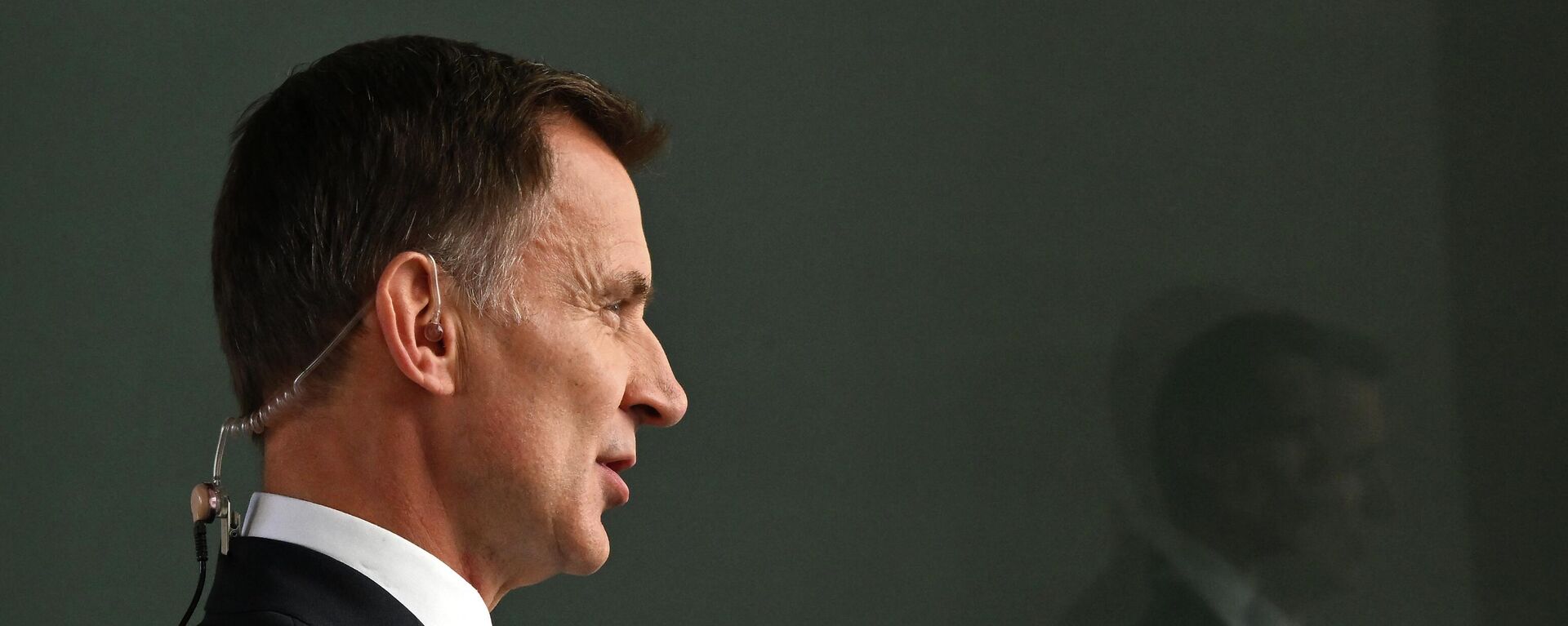https://sputnikglobe.com/20221113/hunt-goes-for-a-hunt-on-a-black-hole-in-british-public-finance-1104065959.html
Hunt Goes for a Hunt on a Black Hole in British Public Finance
Hunt Goes for a Hunt on a Black Hole in British Public Finance
Sputnik International
UK Chancellor Jeremy Hunt is facing tough times since he needs to plug a 55 billion-pound hole in British public finance amidst economic crisis. 13.11.2022, Sputnik International
2022-11-13T09:56+0000
2022-11-13T09:56+0000
2023-03-05T11:22+0000
economy
great britain
jeremy hunt
finance
tax
budget
recession
chancellor
gdp
https://cdn1.img.sputnikglobe.com/img/07e6/0a/11/1101924745_0:0:3071:1728_1920x0_80_0_0_1177ce5a75888f190ef1c69c4139eacf.jpg
Hunt declared ahead of Thursday’s autumn statement that new British budget would be "rabbit-free". On Thursday's autumn statement, the Sunak administration is likely to present its first budget plan since Rishi Sunak replaced Liz Truss as prime minister with a vow to undo her economic policy mistakes.According to media reports, the new government is likely to introduce tough economic measures. For instance, they are probably going to freeze thresholds and allowances on income tax, national insurance, inheritance tax and pensions for a further two years.Hunt and Sunak have to undo the legacy of previous prime minister Liz Truss, whose economic policy was labeled by many economists as 'disastrous'. However, Truss is only part of the story.The British economy has faced problems for many years, with soaring inflation and unemployment. The situation has been aggravated by the COVID pandemic and the political turmoil caused by Brexit. Several prime ministers resigned, being unable to strike a reasonable exit deal with the EU. Also, the UK has seen a wave of industrial unrest this year across industries ranging from railways to the healthcare. Last week's figures show no improvement. The British economy shrunk 0.2% between July and September. If this trend isn't reversed this quarter, the UK will officially be in recession. The Bank of England claims that the recession may last for two years and will be one of the longest in its economic history. The unemployment rate is expected to reach 6.5%. The British government, as a result, hopes that strict fiscal discipline will help safeguard the economy.
https://sputnikglobe.com/20221014/kwasi-kwarteng-reportedly-sacked-as-uk-finance-minister-1101843492.html
great britain
Sputnik International
feedback@sputniknews.com
+74956456601
MIA „Rossiya Segodnya“
2022
News
en_EN
Sputnik International
feedback@sputniknews.com
+74956456601
MIA „Rossiya Segodnya“
Sputnik International
feedback@sputniknews.com
+74956456601
MIA „Rossiya Segodnya“
great britain, jeremy hunt, finance, tax, budget, recession, chancellor, gdp
great britain, jeremy hunt, finance, tax, budget, recession, chancellor, gdp
Hunt Goes for a Hunt on a Black Hole in British Public Finance
09:56 GMT 13.11.2022 (Updated: 11:22 GMT 05.03.2023) UK Chancellor Jeremy Hunt is facing tough times since he needs to plug a 55 billion-pound hole in British public finance amidst economic crisis.
Hunt declared ahead of Thursday’s autumn statement that
new British budget would be "rabbit-free".
"I'm sorry to disappoint but, no, this is not going to be a time for rabbits, I'm afraid", he told British media on Sunday. He also described himself as a "Scrooge who is going to do things that make sure Christmas is never cancelled."
On Thursday's autumn statement, the Sunak administration is likely to present its first budget plan since
Rishi Sunak replaced Liz Truss as prime minister with a vow to undo her
economic policy mistakes.According to
media reports, the new government is likely to introduce tough economic measures. For instance, they are probably going to freeze thresholds and allowances on income tax, national insurance, inheritance tax and pensions for a further two years.
Hunt and Sunak have to undo the legacy of previous prime minister Liz Truss, whose economic policy was labeled by many economists as 'disastrous'. However, Truss is only part of the story.

14 October 2022, 11:36 GMT
The British economy has faced problems for many years, with soaring inflation and unemployment. The situation has been aggravated by the COVID pandemic and the political turmoil caused by Brexit. Several prime ministers resigned, being unable to strike a reasonable exit deal with the EU. Also, the UK has seen a wave of industrial unrest this year across industries ranging from railways to the healthcare.
Last week's figures show no improvement. The British economy shrunk 0.2% between July and September. If this trend isn't reversed this quarter, the UK will officially be in recession. The Bank of England claims that the recession may last for two years and will be one of the longest in its economic history. The unemployment rate is expected to reach 6.5%.
The British government, as a result, hopes that strict fiscal discipline will help safeguard the economy.



